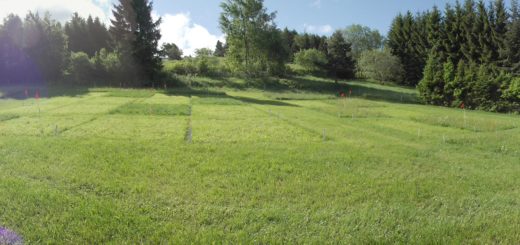Post-CoV conferences?
The year behind us was a year of conferences cancelled or moved online. We felt now may be a good opportunity to sound out how ant researchers feel about attending conferences in the post-CoV era. Three researchers shared their experiences. Check out their answers.
Flash interviews compiled by Florian M. Steiner

Elena Angulo, Spain
MNB: Are conferences still relevant today when we can increasingly access the latest research results via other channels such as preprint servers?
EA: Yes, they still are relevant.
MNB: Is it still timely to attend physical conferences, considering their carbon footprints?
EA: I think it is always interesting to attend physical conferences, even considering their carbon footprints. Although, I would select the ones in the proximity and try to benefit the conference to have some family holidays around.
MNB: Does attending physical conferences increase or decrease your net productivity when you consider, on the one hand, the time it takes to prepare a talk or poster, travel and stay abroad, and recover from jetlag as well as that the “real” publication on your findings still needs to be written and, on the other hand, the stimuli you may receive during the conference in terms of motivation, innovation, collaboration, etc?
EA: I think considering overall negative factors (travel, recover, time that we “lose”) could be compensated by motivation, innovation and collaboration on the long term. Moreover, if it is combined with holidays, the negative factors disappear.
MNB: Can physical conferences be replaced by virtual ones (including beyond the pandemic), during which specific opportunities for small talk are offered such as via break-out rooms?
EA: Yes, I hope virtual conferences or mixed virtual+physical conferences could continue beyond the pandemic. This will benefit researchers in many aspects, e.g. mothers or fathers having -small – children; researchers from countries where no funding is available to pay for the travel and stay, etc.
MNB: What was your best conference ever – and why so?
EA: I have not been at many conferences abroad, besides Morocco, France and Spain (although I have been at international conferences). I think my best one was one organised by the Spanish Myrmecological Society. We went as a family, and I remember especially the bus excursion where I could sit next to some Spanish researchers, and we had interesting conversations that opened my mind and also opened the way for collaborations as it has been the case.
Dalial Freitak, Austria
MNB: Are conferences still relevant today when we can increasingly access the latest research results via other channels such as preprint servers?
DF: I think conferences are still very important, as they allow us to gain experience in presenting and discussing our data with scientific community; this is especially important for young scientists, who rarely talk outside their research group. Anything available online will not allow person-to-person communication in the same way as it is happening at a poster session with a glass of wine in your hand and plenty of time.
MNB: Is it still timely to attend physical conferences, considering their carbon footprints?
DF: Of course we need to pay attention to the environment; however, there are also alternative ways to travel, which are more carbon neutral.
MNB: Does attending physical conferences increase or decrease your net productivity when you consider, on the one hand, the time it takes to prepare a talk or poster, travel and stay abroad, and recover from jetlag as well as that the “real” publication on your findings still needs to be written and, on the other hand, the stimuli you may receive during the conference in terms of motivation, innovation, collaboration, etc?
DF: Conferences are extremely stimulating! The shared number of excellent talks and the academic as well as networking environment are so great for my science and productivity. It is so motivating to see other researchers to present their work and their enthusiasm for the topic. I use conferences to go to as many presentations as I can and often listen to the talks which are not in my strict research field, as I would never have a time to read a paper on it, but now I can just go and pick up new knowledge during the 10 minutes! In addition, conferences have led for me to collaborations resulting in papers and experiments, which would have never happened outside of the conference.
MNB: Can physical conferences be replaced by virtual ones (including beyond the pandemic), during which specific opportunities for small talk are offered such as via break-out rooms?
DF: I think online meetings will not really fill the purpose of conferences; conferences are places to meet people in person, to have a chance to go and talk to specialists in their field. For young scientists to have an opportunity to go and chat with more experienced people in the field. We take time off our very busy teaching, administration, and writing schedule to go to the conferences, and we are more or less all the time present in person. During online meetings, we are still taking care of so many other things in parallel that our attention is not really with talks all the time and after talks, we do not really linger but go back to other daily business. Also, let’s face it, looking for six hours at a screen in your office between other duties will not support the spirit of communication at the end of the day.
MNB: What was your best conference ever – and why so?
DF: I think my best conference ever has been the one-week workshop on Lepidopteran Molecular Biology and Genetics in Kolympari, Crete (it was during my pre-ant period ). It was a small one, for 60-80 people; we all stayed in the same facility, all the meals were behind the same big table on the terrace and there was so much good food and possibility to talk to literally everybody. I did finish up doing an experiment in another lab and got the last paper of my PhD time out of it.
Marion Cordonnier, Germany
MNB: Are conferences still relevant today when we can increasingly access the latest research results via other channels such as preprint servers?
MC: Yes, they are relevant more than ever before! Too many highly interesting papers appear every day. I do not always take the time to read all new research results on my own topics of interest, and I almost never have time to read papers whose issues stand beyond my own projects. Conferences thus offer a great opportunity to satisfy my scientific curiosity; it is also the way to improve my work, get some new ideas and discuss it with other people, something that we definitely cannot do when reading preprints.
MNB: Is it still timely to attend physical conferences, considering their carbon footprints?
MC: I think that we all should be concerned about our carbon footprint, and it starts by avoiding flying to spend only two days at the other side of the Atlantic… Or even closer. So, my answer will be: probably not, although I think that sharing beers, cakes or coffees is also a very powerful driving force for creating new collaborations. The connections created during these informal conversations are precious, especially for young researchers. Mixing virtual and physical participations could be an option to maintain social interactions beyond our closest collaborators and might constitute a good compromise (e.g., physically attending conferences only when accessible by train, but enjoying virtually the conferences from all over the world).
MNB: Does attending physical conferences increase or decrease your net productivity when you consider, on the one hand, the time it takes to prepare a talk or poster, travel and stay abroad, and recover from jetlag as well as that the “real” publication on your findings still needs to be written and, on the other hand, the stimuli you may receive during the conference in terms of motivation, innovation, collaboration, etc?
MC: For sure, physical conferences increase the amount of work both before the conference (talk preparation) and after (new ideas / projects / collaborations). But I do not think that they ultimately decrease my net productivity – well, anyway, I definitely do not conduct my research on a productivity basis.
MNB: Can physical conferences be replaced by virtual ones (including beyond the pandemic), during which specific opportunities for small talk are offered such as via break-out rooms?
MC: It could be great! I haven’t had the opportunity to test this format as of now. But it sounds like nothing will prevent you to travel later to meet some people if it seems to be relevant, and, at least you had an occasion for exchange with them and initiate or build new collaborations with them before.
MNB: What was your best conference ever – and why so?
MC: Such a tricky question! I think it was in 2017 in Orléans, France – an international symposium on “species spread in a warmer and globalized world”. It was one of my first conferences “all on my own”, and it was the perfect mix between too specialized (and thus only between few people of who you already know the work) versus too generic (and thus which fail to meet your own research interests). In this conference, we were only 20 plenary speakers (no short sessions) more than half of which were highly recognized researchers. We therefore really had time to discuss our results, to initiate debates; it was for me two days full of highly constructive discussions, with many feedbacks from fantastic researchers. I met numerous people I have worked with later, and numerous other I would like to work with, one day. And we had a “wine and cheese” cocktail… The icing on the cake.








Recent Comments